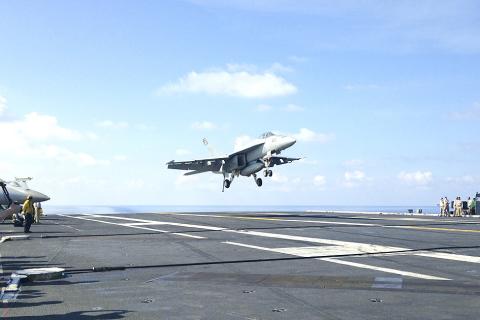The US military conducted “freedom of navigation” operations against 13 countries last year, including Taiwan, and several to challenge China’s claims in the South and East China seas, according to an annual Pentagon report released on Monday.
Multiple operations were against China, India, Indonesia, Iran, Libya, Malaysia, the Maldives, Oman, the Philippines and Vietnam, the report said.
It did not specify how many such operations were conducted against each of those countries.

Photo: AP
The US military carried out single operations against Taiwan, Nicaragua and Argentina, the department said in the report.
The freedom of navigation operations involve sending US Navy ships and military aircraft into areas where other nations have tried to limit access. The aim is to demonstrate that the international community does not accept such restrictions.
The US has repeatedly conducted operations disputing China’s maritime claims in the past few years and did so again in last year, a year in which Beijing’s land reclamation efforts in the resource-rich areas of the South China Sea led to rising tensions in the region.
A US guided-missile destroyer conducted a freedom of navigation patrol near one of China’s artificial islands in the Spratly Islands (Nansha Islands, 南沙群島) in October last year. Taiwan also claims the Spratly chain.
US military flights near the islands have been warned off.
US Secretary of Defense Ashton Carter said the navy would continue to operate in the region despite China’s protests.
The Chinese Ministry of National Defense late on Monday said in a statement on its Web site that it was deeply concerned by such operations.
“The United States carries out militarization in the South China Sea in the name of freedom of navigation and overflight, threatens coastal nations’ sovereignty and security and destroys regional peace and stability,” the ministry said.
It made the comment in response to what it said were reports of recent US military flights near the Scarborough Shoal (Huangyan Island, 黃岩島), an area China seized control of after a stand-off with the Philippine coast guard in 2012. Taiwan also claims the shoal.

A Ministry of Foreign Affairs official yesterday said that a delegation that visited China for an APEC meeting did not receive any kind of treatment that downgraded Taiwan’s sovereignty. Department of International Organizations Director-General Jonathan Sun (孫儉元) said that he and a group of ministry officials visited Shenzhen, China, to attend the APEC Informal Senior Officials’ Meeting last month. The trip went “smoothly and safely” for all Taiwanese delegates, as the Chinese side arranged the trip in accordance with long-standing practices, Sun said at the ministry’s weekly briefing. The Taiwanese group did not encounter any political suppression, he said. Sun made the remarks when

The Taiwanese passport ranked 33rd in a global listing of passports by convenience this month, rising three places from last month’s ranking, but matching its position in January last year. The Henley Passport Index, an international ranking of passports by the number of designations its holder can travel to without a visa, showed that the Taiwan passport enables holders to travel to 139 countries and territories without a visa. Singapore’s passport was ranked the most powerful with visa-free access to 192 destinations out of 227, according to the index published on Tuesday by UK-based migration investment consultancy firm Henley and Partners. Japan’s and

BROAD AGREEMENT: The two are nearing a trade deal to reduce Taiwan’s tariff to 15% and a commitment for TSMC to build five more fabs, a ‘New York Times’ report said Taiwan and the US have reached a broad consensus on a trade deal, the Executive Yuan’s Office of Trade Negotiations said yesterday, after a report said that Washington is set to reduce Taiwan’s tariff rate to 15 percent. The New York Times on Monday reported that the two nations are nearing a trade deal to reduce Taiwan’s tariff rate to 15 percent and commit Taiwan Semiconductor Manufacturing Co (TSMC, 台積電) to building at least five more facilities in the US. “The agreement, which has been under negotiation for months, is being legally scrubbed and could be announced this month,” the paper said,

Japan and the Philippines yesterday signed a defense pact that would allow the tax-free provision of ammunition, fuel, food and other necessities when their forces stage joint training to boost deterrence against China’s growing aggression in the region and to bolster their preparation for natural disasters. Japan has faced increasing political, trade and security tensions with China, which was angered by Japanese Prime Minister Sanae Takaichi’s remark that a Chinese attack on Taiwan would be a survival-threatening situation for Japan, triggering a military response. Japan and the Philippines have also had separate territorial conflicts with Beijing in the East and South China